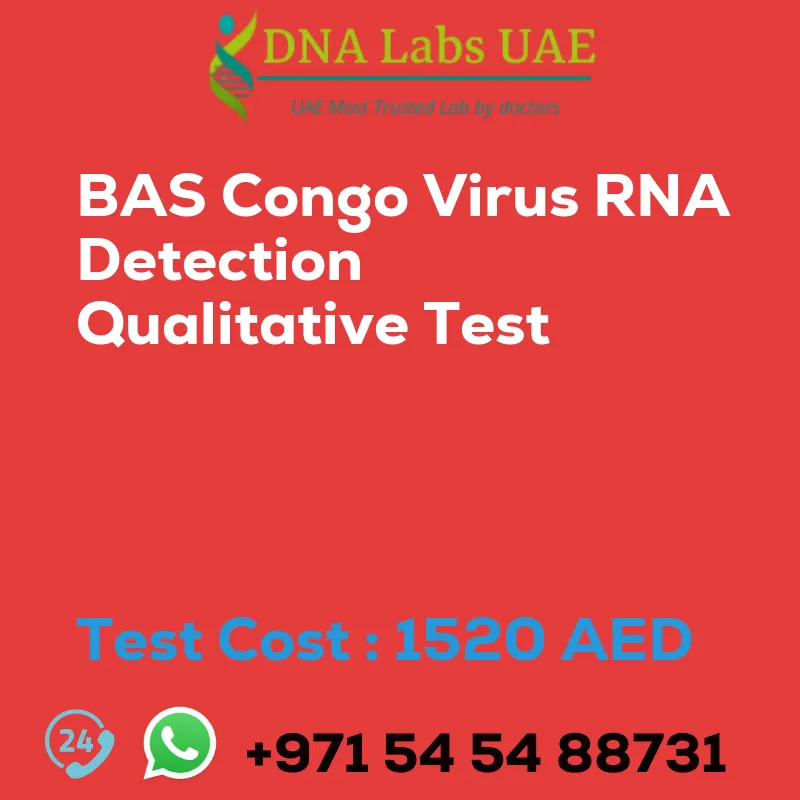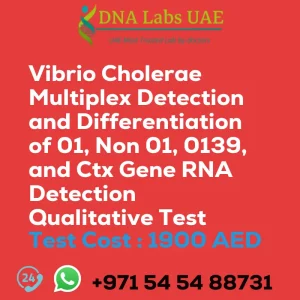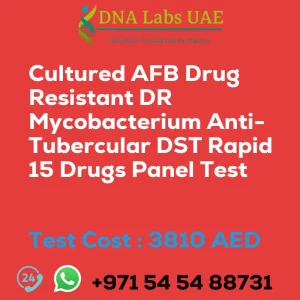BAS Congo Virus RNA Detection Qualitative Test
Test Name: BAS Congo Virus RNA Detection Qualitative Test
Components: Price: 1520.0 AED
Sample Condition: Whole blood, Serum, plasma, CSF, etc.
Report Delivery: 4th Working Day (Email: 48 hours, On phone: 36 hours)
Method: Real Time PCR
Test Type: Viral
Doctor: Physician
Test Department: Genetics
Pre Test Information: Need to sign Consent document and bring any clinical history of patient for BAS Congo Virus (RNA Detection) Qualitative Test
Test Details
The BAS Congo Virus RNA Detection Qualitative Test is a diagnostic tool used to detect the presence of the BAS Congo virus in a patient’s sample. The BAS Congo virus is a member of the Bunyaviridae family and is transmitted to humans through the bite of infected mosquitoes or through contact with infected animals.
This test utilizes a technique called reverse transcription-polymerase chain reaction (RT-PCR) to detect the viral RNA in the sample. RT-PCR is a sensitive and specific method that allows for the amplification of viral genetic material, making it easier to detect even low levels of the virus.
To perform the test, a sample, usually blood or serum, is collected from the patient. The RNA is then extracted from the sample and converted into complementary DNA (cDNA) using the reverse transcription process. The cDNA is then amplified using PCR, specifically targeting the genetic material of the BAS Congo virus.
If the BAS Congo virus RNA is present in the patient’s sample, the amplification process will generate a specific DNA product that can be detected using various methods, such as gel electrophoresis or fluorescent probes. The presence of the specific DNA product indicates a positive result, indicating that the patient is infected with the BAS Congo virus.
The BAS Congo Virus RNA Detection Qualitative Test is an important tool for early diagnosis and surveillance of the BAS Congo virus infection. It helps healthcare professionals in implementing appropriate control measures to prevent the spread of the virus and provide timely treatment to the infected individuals.
| Test Name | BAS Congo Virus RNA Detection Qualitative Test |
|---|---|
| Components | |
| Price | 1520.0 AED |
| Sample Condition | Whole blood,Serum, plasma, CSF, etc. |
| Report Delivery | 4th Working Day Email : 48 hours.On phone : 36 hours |
| Method | Real Time PCR |
| Test type | Viral |
| Doctor | Physician |
| Test Department: | Genetics |
| Pre Test Information | Need to sign Consent document and bring any clinical history of patient forBAS Congo Virus (RNA Detection) QualitativeTest |
| Test Details |
The BAS Congo Virus RNA Detection Qualitative Test is a diagnostic tool used to detect the presence of the BAS Congo virus in a patient’s sample. The BAS Congo virus is a member of the Bunyaviridae family and is transmitted to humans through the bite of infected mosquitoes or through contact with infected animals. This test utilizes a technique called reverse transcription-polymerase chain reaction (RT-PCR) to detect the viral RNA in the sample. RT-PCR is a sensitive and specific method that allows for the amplification of viral genetic material, making it easier to detect even low levels of the virus. To perform the test, a sample, usually blood or serum, is collected from the patient. The RNA is then extracted from the sample and converted into complementary DNA (cDNA) using the reverse transcription process. The cDNA is then amplified using PCR, specifically targeting the genetic material of the BAS Congo virus. If the BAS Congo virus RNA is present in the patient’s sample, the amplification process will generate a specific DNA product that can be detected using various methods, such as gel electrophoresis or fluorescent probes. The presence of the specific DNA product indicates a positive result, indicating that the patient is infected with the BAS Congo virus. The BAS Congo Virus RNA Detection Qualitative Test is an important tool for early diagnosis and surveillance of the BAS Congo virus infection. It helps healthcare professionals in implementing appropriate control measures to prevent the spread of the virus and provide timely treatment to the infected individuals. |








